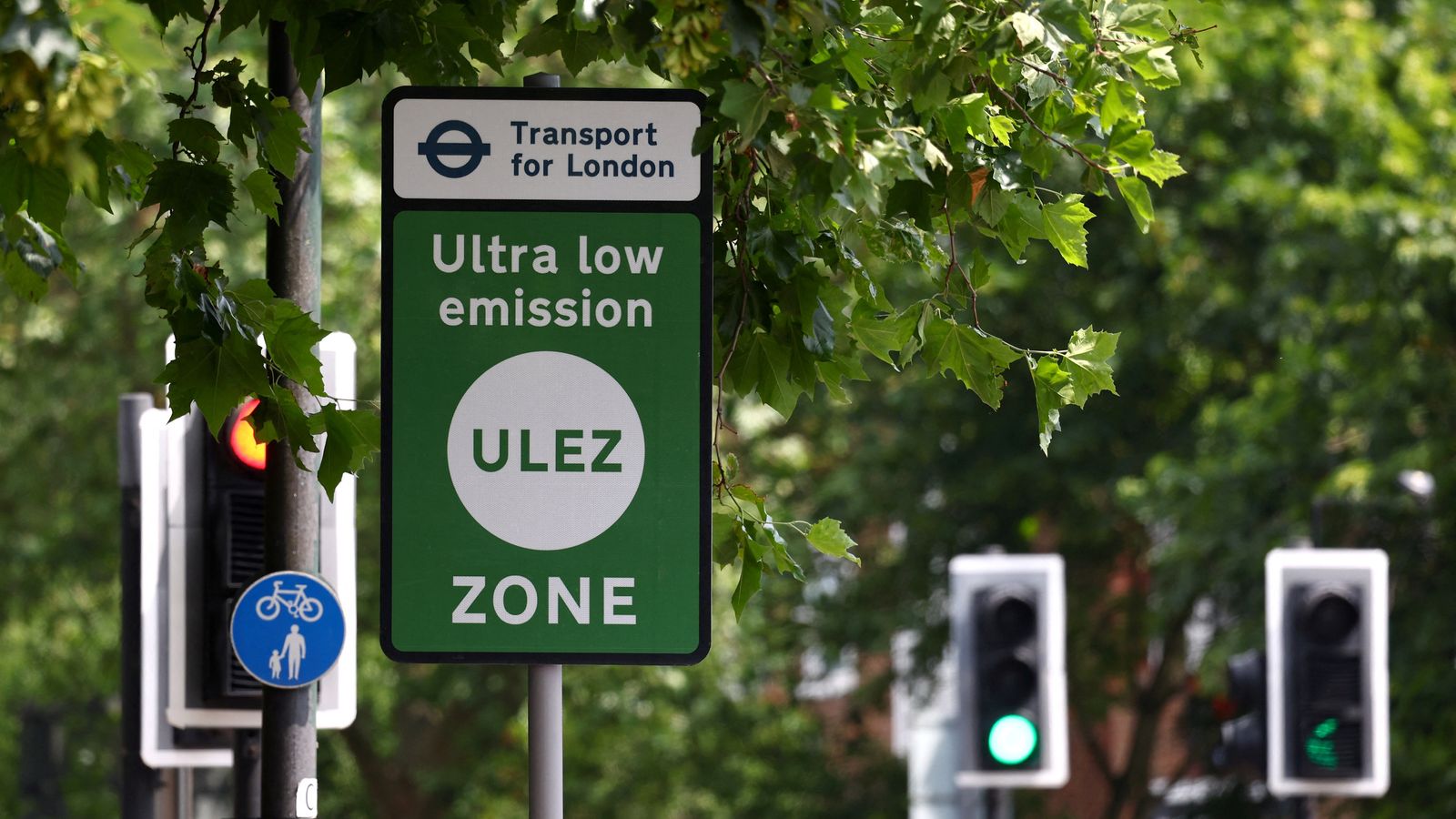The expansion of ultra-low emission zone (ULEZ) to outer London boroughs has been ruled lawful by the High Court.
Five Conservative-run councils had launched legal action back in February over the expansion.
The scheme will come into force from 29 August and see the drivers of the most polluting vehicles charged £12.50 a day to use them.
The hope of those behind the plan is it will incentivise people to use cleaner transport alternatives and, as a result, help improve the city’s air quality.
And TfL has claimed only a small number of people will be impacted, with nine out of 10 vehicles compliant with ULEZ requirements.
But the councils challenged the roll-out in the courts, saying the capital’s Labour mayor, Sadiq Khan, had exceeded his legal powers with such a large expansion of the scheme.
Please use Chrome browser for a more accessible video player
The five local authorities – Hillingdon, Bexley, Bromley and Harrow in London, plus Surrey County Council – also claimed the consultation on the plan was flawed, and not enough information had been shared over the scrappage scheme, which provides pay-outs to people prepared to ditch their vehicles.
High Court ruling on ULEZ expansion to be published on Friday
Rishi Sunak to intervene in Sadiq Khan’s London housebuilding plan
ULEZ: Starmer ‘wobbling’ on ULEZ, says mother of girl who died due to pollution
While other parts of the challenge were dismissed in April, the councils were granted a hearing in the High Court, and the two sides fought it out over two days of evidence.
The ruling comes a week after the debate around ULEZ dominated a local by-election and the fall-out from the results.
The seat of Uxbridge and South Ruislip – left vacant by the departure of Boris Johnson – seemed ripe for the taking for Labour in light of recent polling that gives the party a double digit lead over the Tories.
Please use Chrome browser for a more accessible video player
But the Conservative candidate managed a narrow victory – albeit seeing the majority for the party fall from over 7,000 to less than 500 – having turned its campaign into a referendum on ULEZ.
Since then, Labour have been in turmoil over the policy and whether to support it, with Sir Keir Starmer saying he had asked the mayor to “reflect” on the impact of the scheme.
However, Mr Khan has said he is committed to ULEZ expansion, telling Sky News: “It was a difficult decision to take. But just like nobody will accept drinking dirty water, why accept dirty air?”
Following the ruling, Mr Khan said the “landmark” decision was “good news as it means we can proceed with cleaning up the air in outer London on 29 August”.
“The decision to expand the ULEZ was very difficult and not something I took lightly and I continue to do everything possible to address any concerns Londoners may have,” he said.
“The ULEZ has already reduced toxic nitrogen dioxide air pollution by nearly half in central London and a fifth in inner London. The coming expansion will see five million more Londoners being able to breathe cleaner air.”
Mr Khan said that from next week he would expand the scrappage scheme to “nearly a million families who receive child benefit” and all small businesses with up to 50 employees.
“Nine out of 10 cars seen driving in outer London on an average day are already compliant so won’t pay a penny – yet will still see the benefits of cleaner air.
“Air pollution is an urgent public health crisis – our children are growing up with stunted lungs and it is linked to a host of serious conditions, from heart disease to cancer and dementia.
“This unambiguous decision today in the High Court allows us to press on with the difficult but vital task of cleaning up London’s air and tackling the climate crisis.”
Steve Tuckwell, the Conservative MP for Uxbridge and South Ruislip who campaigned against ULEZ expansion during the by-election, said constituents had sent a “clear message” to the mayor to “halt your ULEZ expansion”.
Political correspondent
After a bumpy week for the Mayor’s ULEZ expansion, this is very good news for Sadiq Khan.
If this legal challenge had succeeded, it could have meant a delay to next month’s rollout as elements of the consultation process were run again.
But whilst this legal hurdle has been cleared, political ones remain.
Labour leader Sir Keir Starmer has made it clear that he wants there to be a rethink– after the expansion plan cost his party the Uxbridge by-election last week.
The London Mayor has said he’s open to ideas to help people impacted by the charge but is determined to plough on with the central policy on the current timetable.
That opens a rift between party headquarters and one of the most senior elected Labour politicians in the country.
A compromise could involve the scrappage scheme being bolstered further but that would likely come with more requests for cash from Central government.
The Tories will attempt to turn next spring’s London mayoral elections into a referendum on ULEZ expansion.
The hope in City Hall will be that by forcing this controversial policy through now without delay, tempers may have cooled by the time Londoners head to the ballot box.
“Londoners cannot go on being ignored by the Labour Party, who are making the choice to expand ULEZ, saddling families and businesses with a £4,500 a year charge – a tax on carers, parents, patients, sole traders and all hard-working Londoners,” he said.
His words were echoed by Susan Hall, the Conservative candidate who will take on Mr Khan at next year’s mayoral election, who said: “While it is a shame the High Court did not find the ULEZ expansion to be unlawful, there is no denying that Sadiq Khan’s plans will have a devastating impact on families and businesses across the city.
“If I am elected mayor, I will stop the ULEZ expansion on day one and set up a £50m pollution hotspots fund to tackle the issue where it is, instead of taxing people where it isn’t.”
As well as putting pressure on Mr Khan, the ULEZ policy also prompted a debate within the Tory Party and emboldened the more climate sceptic wing of the party, who want Rishi Sunak to slow down the transition to net zero.






















